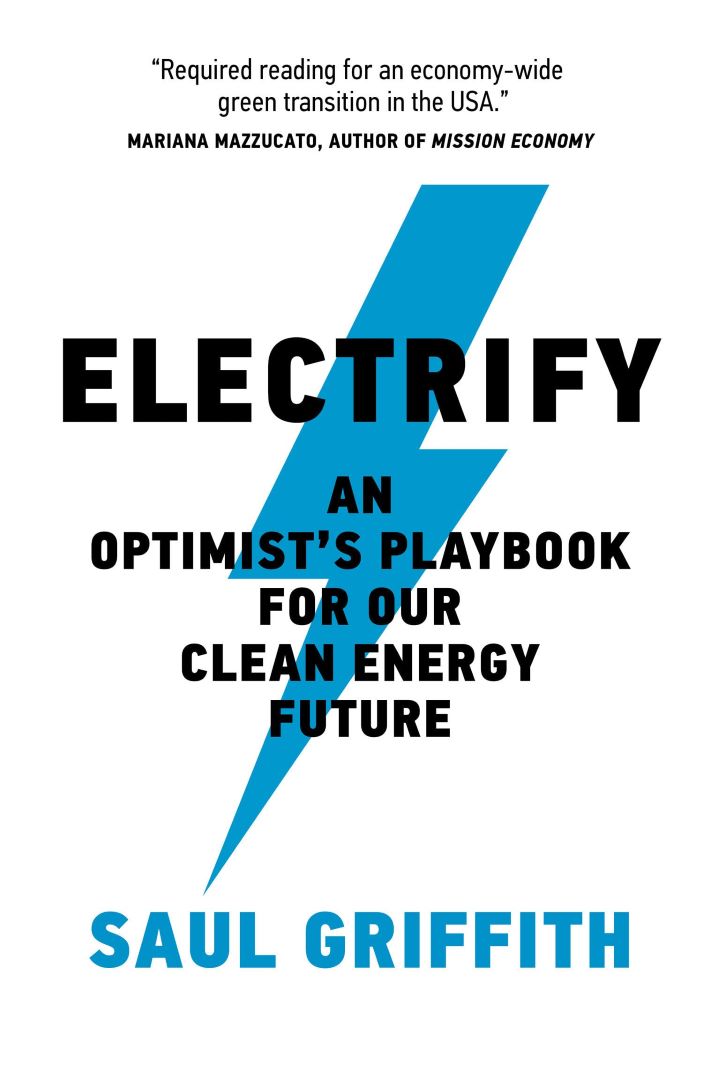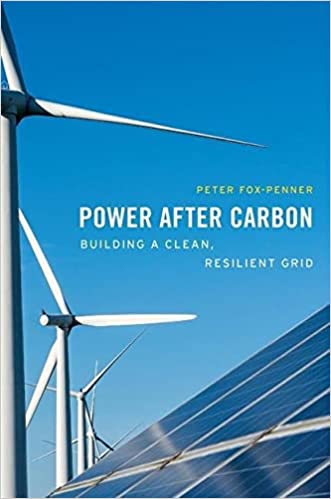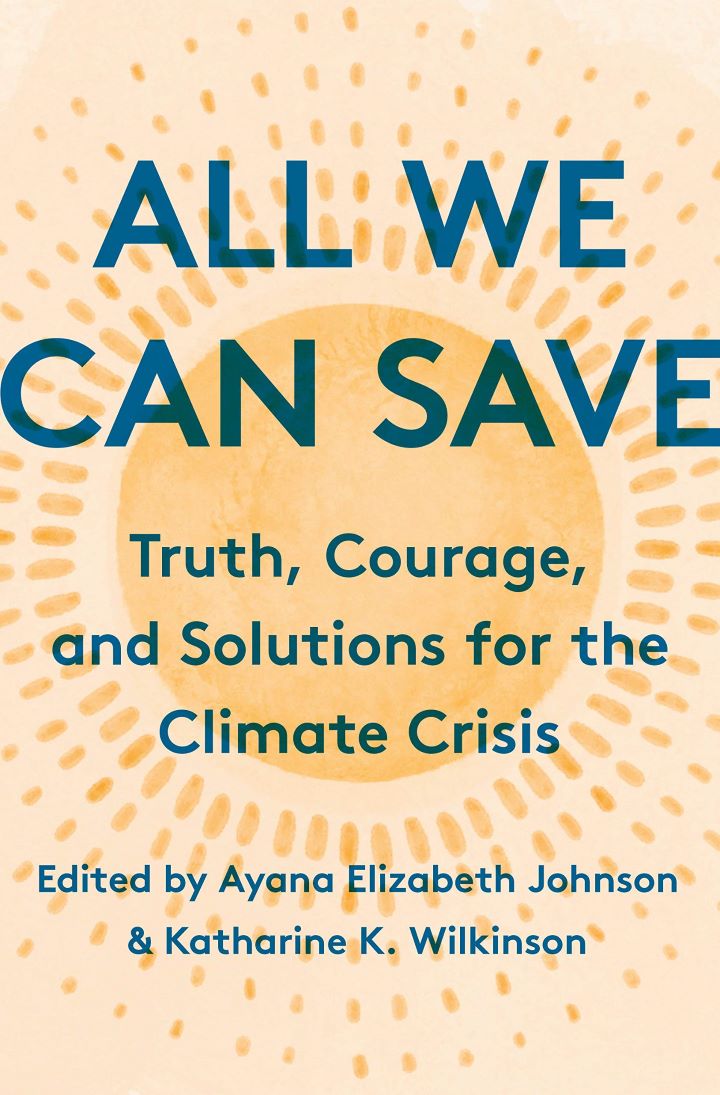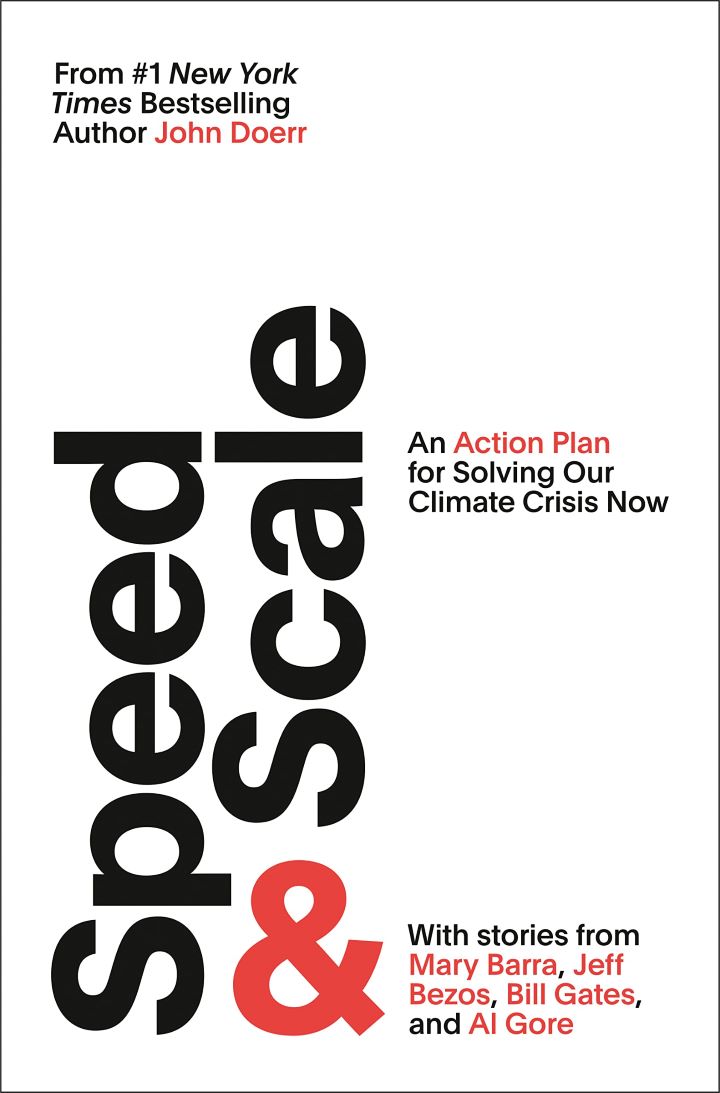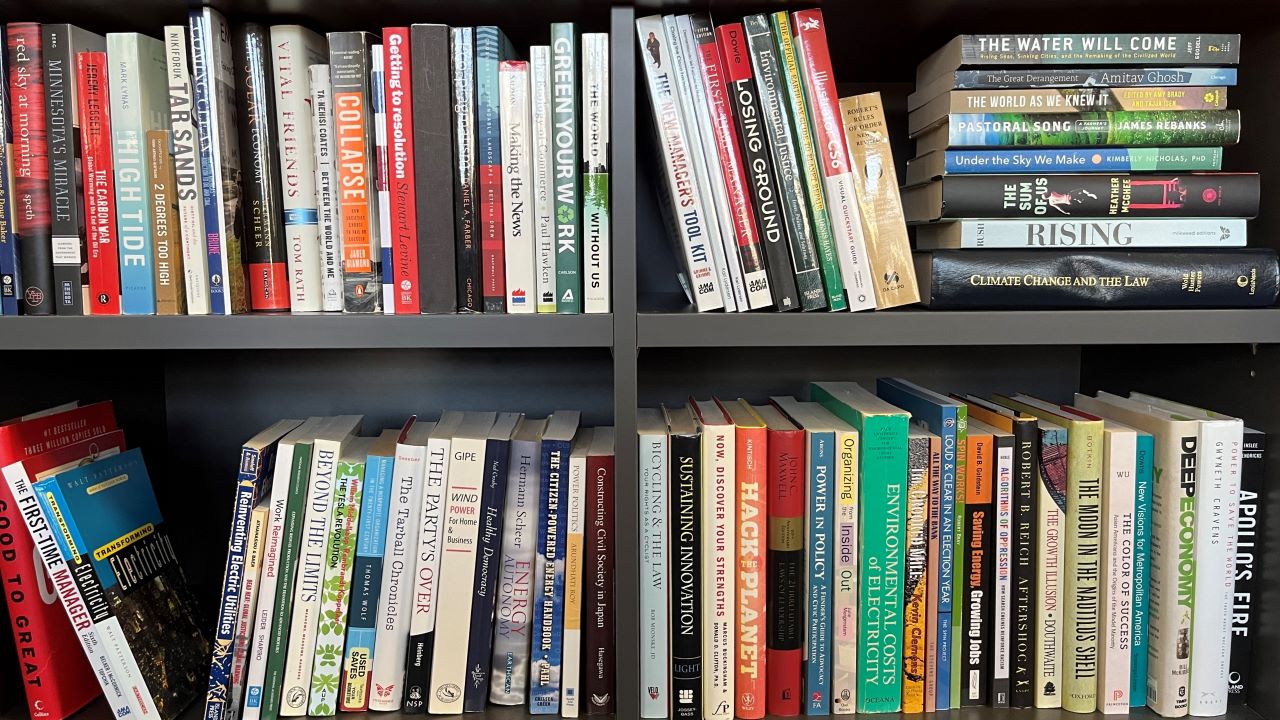
A special area of Fresh Energy’s new office space in downtown Saint Paul is our community library. Boasting hundreds of books of research, stories, observations, and beyond about clean energy and climate, the community library is a favorite of staff and visitors. Shelves are refreshed annually with new titles. As we reflect on the wealth of knowledge contained in our community library, we thought it would be fun to sit down with Michael Noble, Fresh Energy’s executive director, to learn about four of his favorite recently acquired titles!
1. Electrify: An Optimist’s Playbook for Our Clean Energy Future, by Saul Griffith
“In Electrify, Saul Griffith is writing about how to electrify everything we can. And, at our core, this is Fresh Energy’s main strategy for decarbonization,” Michael says. “We’re working to get all the carbon out of our electricity supply, and then electrify everything we can. In this book, Saul shows the numbers to back up our position,” he adds.
The crux of Electrify is to impress upon readers that we must double or triple the size of the clean, electric power system in order to electrify everything that we can—we must build greater reliability in order to meet demand with increasingly clean, renewable energy. Fresh Energy’s Clean Electricity team, among others, is engaging in grid modernization and decarbonization and transmission buildout at multiple levels of influence, from macro-focused areas like MISO, our grid operator, to statewide focuses, broader regional territories and, even smaller than that, community aspects with utility customers.
With Electrify, Griffith focuses on the jobs and the technology that are getting us closer to an all-electric future, emphasizing the role building and property owners, individual people and families, as well as small businesses, can play in amping up electrification of homes, space and water heating, transportation, and more.
Michael says, “Saul makes it clear that all of these things can be substituted with electric technology, and that this needs to happen now—because we have a lot less time than we think we do. It’s a really well-written book that looks at the big picture and presents a roadmap for how to tackle electrifying the sum of energy flowing through society while creating jobs to service that deep electrification.”
2. Power After Carbon: Building a Clean, Resilient Grid, by Peter Fox-Penner
Power After Carbon tackles the idea of what it means to get to a zero-carbon electricity supply across the globe. “This book from Peter Fox-Penner,” Michael says, “is basically admitting that the future of the electric power system is different from the past because now, all serious people who understand the gravity of the climate emergency agree and admit that our future has to be free from carbon. And that’s new, that’s different, and that’s both revolutionary and necessary,” he adds.
The core idea of Power After Carbon, in Michael’s eyes, is that if we all agree that the power system has to be carbon-free, and that it has to be twice or three times as big as it is today, we have to keep all of our tools in the toolbox to tackle building that carbon-free power system. To Michael, Fox-Penner’s Power After Carbon is a statement: We need to focus on reliability and affordability, and we need to ensure that electricity is universally available, abundant, resilient, and reliable—so we can’t write off any of the incredible clean energy technologies that exist today, even in their early stages, that can help us secure those ideals.
In Michael’s eyes, Fox-Penner has both the street cred and the credentials to say all of these things and open an honest discussion that acknowledges all the limitations and challenges to what Fox-Penner calls “Electricity’s Third Act”—the future of electricity. “This is a book about building the system on what we know and going as fast as we can with that,” like wind and solar and battery storage, “and then also keeping our eye on the stuff we don’t know as much about yet, because we might need that stuff too.”
3. All We Can Save, edited by Ayana Elizabeth Johnson and Katharine K. Wilkinson
All We Can Save is an impressive, bestselling anthology of writings by 60 women who are at the forefront of the climate movement harnessing truth, courage, and solutions to lead humanity forward at this critical moment within our collective climate and clean energy legacy. Rolling Stone referred to it as “A feast of ideas and perspectives, setting a big table for the climate movement, declaring all are welcome.”
Having highlighted other titles that hold space for all solutions—both those we know to work well and those we’re yet working out the kinks on—Michael emphasizes that this book encourages us to keep up the good work while training a spotlight on women who are leading the climate, clean energy, and environment spaces in a bold and ambitious search for solutions that are built by all and benefit all. “All We Can Save is solutions oriented. The poetry and art in this book are from vital voices and agents of change on this planet who are leading us forward and reminding us of all that we have readily available to us to create the equitable, accessible, abundant, and resilient clean energy future we need and know is possible.”
Pairing deep dialogue about the climate crisis with community-building around climate solutions, All We Can Save serves as a “grounding and jumping off point” for growing and strengthening the climate movement via small group discussions and open-source facilitation materials designed to build connection and spur action. Find out more about All We Can Save Circles.
4. Speed and Scale: An Action Plan for Solving Our Climate Crisis Now, by John Doerr in collaboration with Ryan Panchadsaram and Anjali Grover.
“This book by John Doerr in collaboration with Ryan Panchadsaram and Anjali Grover is one of the most important books of the year,” Michael says. “It lays out very clearly all of the things the United States must do to get carbon out of our electric system—and urges that we must do it now. Fresh Energy, for the past 30 years, has been working on nearly all of these areas John, Ryan, and Anjali identify—and if we don’t work directly on them, we’ve got policies and programs that encourage investment and action in these areas.”
Speed and Scale presents a compelling 10-step plan to get to net-zero globally by 2050 and outlines a method for carrying out the most important tasks related to Doerr, Panchadsaram, and Grover’s plan. Michael says, “This book reinforces that we should keep track of the most important things, measure our progress against them, and keep an eye always toward improving our collective clean energy future.”
Special offer for Benefit Breakfast guests! We’re excited to announce Ryan Panchadsaram will be a special guest at this year’s Benefit Breakfast! Ryan has generously donated 300 copies of Speed and Scale to Fresh Energy, and you can get one for free! Register to join us on Thursday, October 13, at this year’s Virtual Benefit Breakfast, and check the box to receive your copy of the book during the registration process.*
RSVP today to join Fresh Energy and featured speaker, acclaimed journalist Julian Brave NoiseCat, at the Benefit Breakfast for an inspiring discussion about driving an ambitious agenda at this critical moment for clean energy and climate.
Bonus: Julian Brave NoiseCat is also releasing his debut nonfiction book We Survived the Night, which weaves together reporting on Indigenous peoples in the United States and Canada with personal narrative. More details on the release date to come.
Make sure you’re signed up to receive updates from Fresh Energy to stay in-the-know about all special announcements for the Benefit Breakfast, and keep an eye out on the blog for staff book favorites in the coming months as well!
*While supplies last. Allow 4–6 weeks for delivery.

